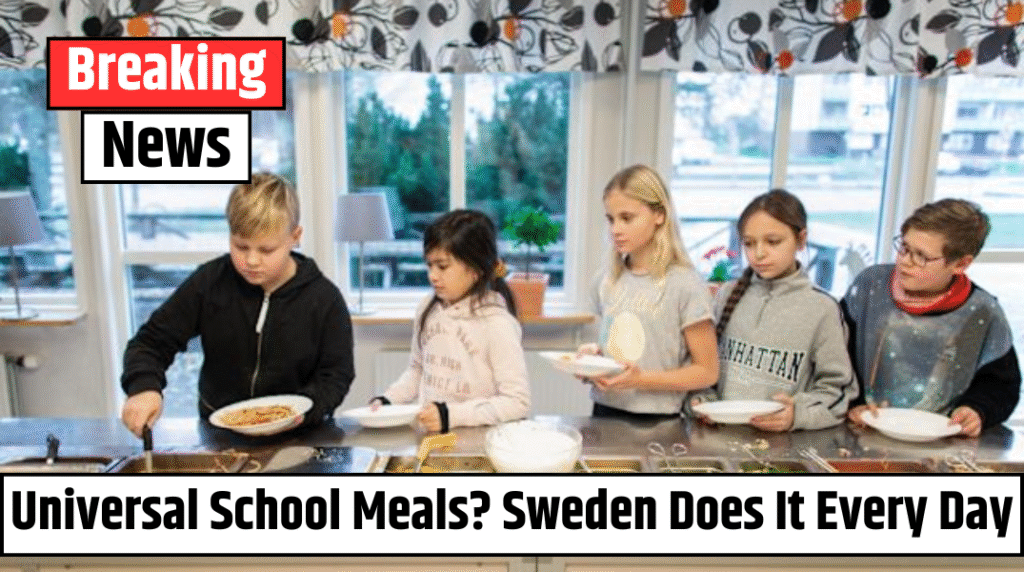As England expands its free school meals to include families on Universal Credit, experts and educators are looking to Sweden as the gold standard in universal school nutrition — a model that’s been in place for decades and continues to deliver impressive results.
The UK government’s decision is expected to benefit around 500,000 children, saving families up to £500 annually and lifting thousands out of poverty. Still, critics argue the move doesn’t go far enough. While Wales, Scotland, and London already offer universal meals to younger children, Sweden offers free hot lunches and snacks to every pupil aged 6 to 16 — with measurable success.
A Long-Standing Commitment to Nutrition
Yvonne Andersson, a retired Swedish headteacher with 43 years of experience, says that Sweden’s approach is unlike any other. “I’ve had education professionals from places like England and Tanzania visit to see our lunchtime routines. They’re often amazed — and rightly so. We’ve built something unique,” she said.
Sweden’s school meals system has deep roots, beginning in the 1800s with porridge and milk for poor children. By the late 1930s, the government had begun subsidizing meals more widely, and since 1997, all municipalities have been legally required to provide nutritious, free meals to all students in compulsory education.
For Andersson, who grew up in Malmö after World War II, free school lunches were simply a fact of life: “I’ve never known anything else.”
What the School Day Looks Like
At the schools Andersson led in Veberöd, children could start their day with a free breakfast at 7 a.m. Preschool and after-school care participants were automatically included. Later, all students followed a structured meal routine — escorted by teachers to the cafeteria, where they could choose from a buffet with at least four options, including vegetarian and special diet choices.
Also Read – How to Close the Attainment Gap for Poorer Pupils in Schools
“All staff members eat with the students,” Andersson said. “This isn’t just lunch — it’s an educational opportunity. Teachers sit with their pupils and continue guiding them.”
Afternoon snacks are also standard — known as “fika” in Swedish culture — ensuring that children remain energized and focused throughout the day.
Remarkably, leftover meals don’t go to waste. Andersson explained that at her school, unused food was offered to local pensioners for a low price, strengthening community ties and promoting sustainability.
The Long-Term Benefits
Research by Professor Petter Lundborg at Lund University has shown that free school meals in Sweden offer more than just short-term relief — they generate lasting social and economic benefits. Children who received school meals throughout their compulsory schooling grew taller, were more likely to attend university, and saw higher lifetime earnings.
“Children from low-income families benefitted most, but universal access meant that all children gained something — without any stigma,” Lundborg explained. Gains for disadvantaged students were especially notable, with lifetime earnings increasing by as much as 6%.
While no measurable changes were found in overall health outcomes or school attendance (which was already high), the academic and developmental advantages were clear. Importantly, the program didn’t contribute to rising obesity levels, suggesting balanced nutrition.
How It’s Funded
Sweden funds the program through local taxes, with municipalities determining how much to allocate. The national government sets standards for quality and access, but local governments manage budgets and implementation.
“In Lund, we contribute just over 21% of our income to municipal taxes, which fund services like school meals,” Andersson said. “The money is distributed based on the size and needs of each school.”
She emphasized that the universal model is what makes it work: “Everyone eats together — regardless of income. It’s not just about nutrition. It’s about equity.”
Also Read – England Expands Free School Meals – What Universal Access Could Mean
A Safety Net for Vulnerable Children
Andersson shared stories of children from unstable households who found reliability and comfort in school meals. In one case, she insisted three siblings join after-school care so they wouldn’t go hungry.
“The difference was immediate. These children had energy. They learned better. They smiled more,” she recalled. “Sometimes, food is more than food — it’s dignity, it’s a chance.”
What the UK Could Take Away
As the UK government considers the next steps in expanding its own free meals policy, Sweden offers a compelling model. Universal access, community integration, and early nutritional support are key pillars of a program that has transformed not just school days but entire lives.
“Even the pickiest, most privileged children benefit,” Andersson said with a smile. “When everyone eats the same food together, everyone belongs.”



